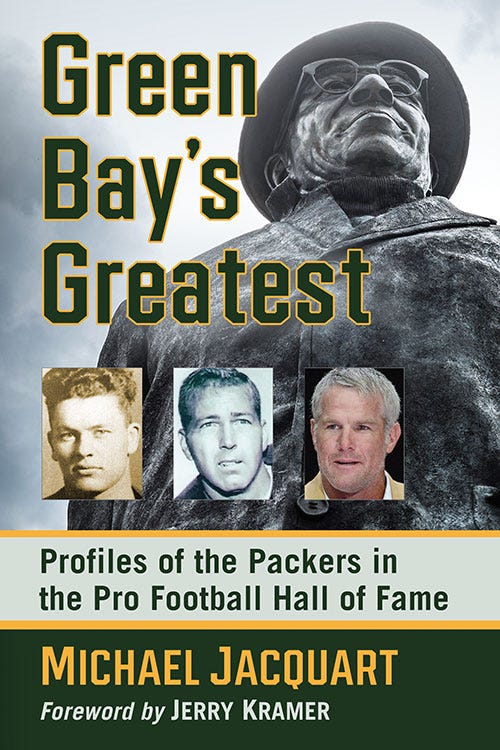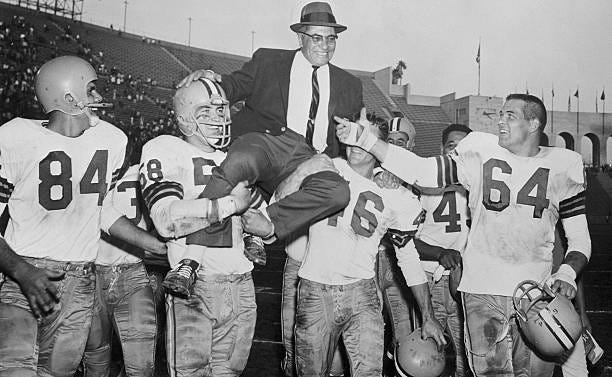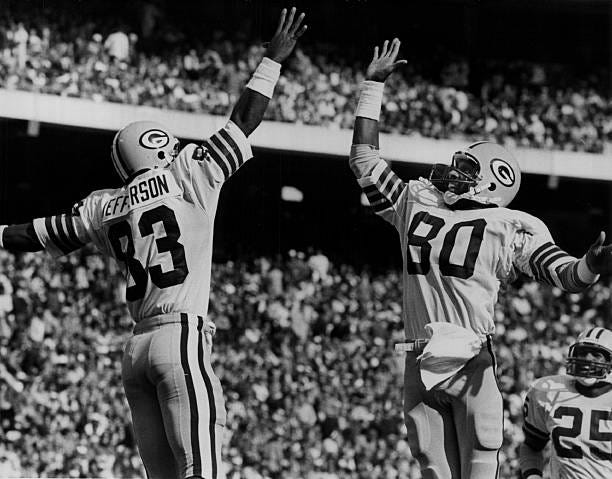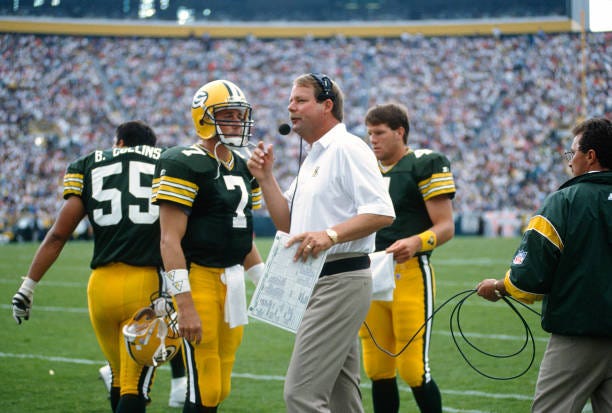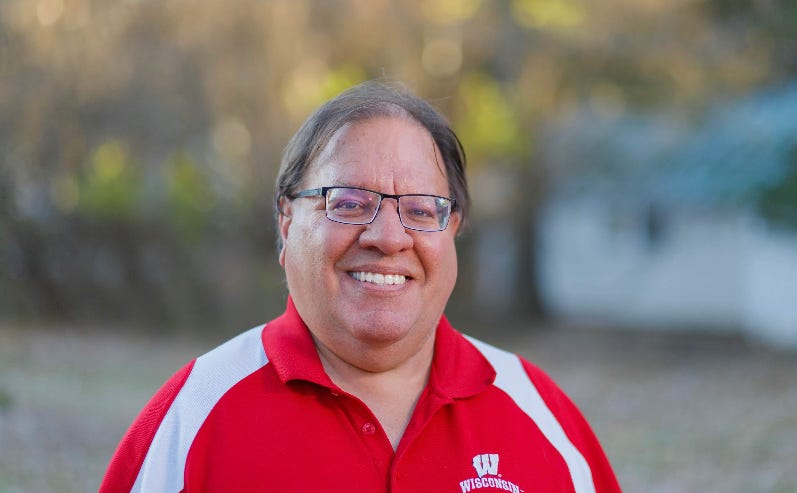'Green Bay's Greatest' dives into legendary Packers hall-of-famers
Author Mike Jacquart has certainly seen his share of highs and lows following the Green Bay Packers for more than 50 years.
To the mostly forgettable teams of the 1970s and 1980s to seeing two Super Bowl titles and a sustained level of success the past 30 years, Jacquart has followed the Packers through thick and thin with a keen eye on the team’s legendary past.
Jacquart, recently retired from a long career in journalism and editing, has published his second book on the Green and Gold, “Green Bay’s Greatest,” a collection of profiles on Packers in the Pro Football Hall of Fame. His work is a follow-up to “100 Greatest Packers of the Century,” published in 2019 — the same year the Packers celebrated their 100th birthday.
In a recent phone interview, Jacquart chatted about his latest book, uncovering new details about players who’ve been gone a long time, but shouldn’t be forgotten, the genius of Vince Lombardi, and which legendary Packers are next in line for enshrinement into Canton.
NFL Rewind: How did you come up with the idea for your book?
Jacquart: Well, it came off a couple of things. When I published my first Packers book in 2019, I had to use a certain criteria for ranking them and one of the best ways I did that was whether they were in the Pro Football Hall of Fame. If they were, they started getting pretty high up the list. The other thing was, you know they show the facade around Lambeau Field with all the players listed. Well, how many people really know who all these people are? The Lombardi years alone are getting to be so gosh darn long ago, let alone the guys even before that.
I came across Joe Zagorski who wrote a book on the ‘72 Packers and he introduced me to McFarland (publisher) and his editor and I pitched them a few ideas. My original idea was to write a biography on Don Hutson, but he died so many years ago and played so many years ago, I thought that was just going to be a nightmare to do, especially finding out how many words a traditional book publisher wanted. One of my other ideas was Packers in the hall of fame, and that one they went for. I dove in from there. One of the things I liked about writing it was focusing on the (Curly) Lambeau era guys. Outside of maybe Hutson, those guys don’t get enough credit for how good they were — they won six championships.
I felt like I was back in college with the amount of research I was doing. But I went to the local library, tracked down a bunch of books, went through the newspaper archives, and just went from there. The writing was probably the easiest part. I set goals to do a chapter a week and that was kind of how I got started on writing it.
NR: What was the most enjoyable part of putting together the book?
Jacquart: Oh, I would say the writing. Especially writing about certain players and coaches and what I learned. You think you know a lot but when you’re doing a project like that, you find out you don’t know half as much as you think you know. Vince Lombardi, for instance, had this reputation of being this tough coach who yelled at his players every day, but you don’t realize how many aspects there were to the guy’s personality. He went to Mass every day. He was WAY ahead of the curve when it came to race relations. He didn’t care if a guy was Black or white, he just wanted a good football player. In an era when there’s very few black players in football, he’s trading for Willie Davis, picks up Willie Wood in 1960 and he’s drafting Herb Adderley the year after that. All of those guys are in the hall of fame.
He also helped improve race relations in Green Bay. He made it know they weren’t going to get discriminated against. He helped some of those guys find better housing and just went above and beyond. Did a lot of things for the players’ wives, too. You don’t hear a lot about that stuff. Sure, he yelled at the guys, but I found out he yelled at some guys more than others. Lombardi had a sixth sense for knowing which guys could handle getting chewed out and which guys would just go into a shell — that guy he wouldn’t lay into as much. He was also very good at following up and saying, “Hey, you’re a great player.” Jerry Kramer is a perfect example of that. There’s a pretty famous story where he’s demeaning Kramer left to right and Jerry was about to quit football. Well, Lombardi comes into the locker room, ruffles up Kramer’s hair and says, “Hey, you’re going to be the best guard in football.”
He knew what buttons to push, like a master psychologist. Lombardi knew when they needed a good chewing out, but also knew when he had to build them up, too.
I also found out what a character Johnny “Blood” McNally was. He made Paul Hornung look like a monk. He was wild as wild was. They all have an interesting story and that was something I wanted to weave into the book. Not just make it about statistics; I tried to relate to them as much as I could. What were they like as a person? Some of them came from very poor backgrounds. They all ended up being interesting in different ways.
NR: When did you start following the Packers?
Jacquart: Early ‘70s. Unfortunately, I barely remember the Lombardi years. I was in grade school and my dad was such a sports nut and follower that he would get the Packers yearbooks every year. He would tell me tales about these guys and between that and coming across stuff you find online, you kind of feel like you saw them play but really most of my early memories of the Packers are from when they sucked in the ‘70s.
Now, the ‘72 team stands out. They actually won the division and made the playoffs. I mentioned in the book they made the playoffs once in both the ‘70s and ‘80s. That’s hard to comprehend as good as they’ve been in more recent times. Until (Mike) Holmgren and (Ron) Wolf came along (in 1992), they were pretty rotten to be honest. Sometimes they were entertaining, but good as a team, not too much.
NR: How frustrating was it to watch those teams of the early ‘80s? With Lynn Dickey, Paul Coffman, James Lofton, etc., they had one of the league’s best offenses, but it seemed like the defense always let them down.
Jacquart: It was very maddening. Dickey always used to say that’s why he was willing to risk interceptions, he could never trust the defense. The game in ‘83 on Monday Night Football when they upset the Redskins — it was like a track meet. It was like some of the college and pros games you see today, just up and down the field. That wasn’t common back then. Packers go ahead, 48-47, but if Washington makes a field goal at the end, they lose that game. They scored 48 points and almost lost! That’s how much you could trust the defense. And I really don’t know why they were that bad on defense, they had a few good players. (Mike) Douglass was a good linebacker, Johnnie Gray was good in the secondary. I don’t know if it was scheme or what, but they couldn’t stop anybody. If they would have had a decent defense, they would have made the playoffs a few times.
Kind of what sucked about it, Kevin, because the Packers were usually out of it by November, some of my friends and I would adopt another team that was heading to the playoffs, just to make the season more interesting. For us, that was Joe Montana and the 49ers.
NR: The ‘89 “Cardiac Pack” really got me into football as a kid. Why do you think that squad was able to find success after many years in the dumps?
Jacquart: It looked like the beginning of a turnaround. It was pretty surprising to most of us when they had success.
Then, a few years later comes along this crazy Favre guy. Man, did he have velocity on this throws. It’s like, ‘Holy crap, this guy’s got an arm.” I grew up watching (John) Elway thinking he had a gun and then this guy comes along throwing harder than Elway. Those were some fun years because we didn’t think the Packers would come around again.
Funny story. 1992 I’m over at a friend’s house. We’re watching Super Bowl XXVI, Redskins vs. Bills. It was just after the Packers hired Holmgren. We were so negative on the Packers at the time. It was like, “Who’s Mike Holmgren — he’s another guy that will lose.” Not only were the Packers losing, every single coach had a worse record than the one before. Just losing more as the years go by. (Bart) Starr wasn’t very good; Gregg was worse. Other than that, one charmed year (‘89), (Lindy) Infante pretty much sucked. So, they hire Holmgren and it’s like, “Yeah, right, like he’ll be the one.” In fact, Wolf was advised not to take the GM job. They just had that reputation. The good thing was it was easy to get a ticket to the games in those days.
NR: Supposedly Bill Parcells was close to taking the job in ‘92, right? He was close to Wolf and was interested.
Jacquart: From what I know and have read, I’m pretty sure Parcells was the frontrunner for that job, but he had a heart condition at the time and bowed out. That’s why Wolf jumped on getting Holmgren.
NR: Do you think Holmgren has a realistic shot of making the hall of fame?
Jacquart: He does, but personally I’m not in his camp. I have him in the honorable mention section of my book. You know who I really think should be in the hall of fame? Bob Harlan. I put him above Holmgren. Harlan hired Wolf, hired Ted Thompson, he came up with the referendum where they renovated Lambeau Field for $400 million which is chump change for what costs to build a stadium these days. He stopped the games at Milwaukee County Stadium in the ‘90s — they were losing money in any game they played in Milwaukee.
I would also have Jack Vainisi in the hall of fame, although he’s a long shot being that far back. I remember my dad talking about him. Vainisi drafted all of those guys in the ‘50s: Gregg, Bart Starr, Hornung… he was also instrumental in hiring Lombardi in 1959. He’s not in the hall of fame and that’s because the poor guy died young of a heart attack.
I wouldn’t vote for Holmgren. They should have won more than one Super Bowl with that team. I’ve always held that against him. If he’s that good of a coach, they beat Denver. He didn’t win that game and kind of bolts (to Seattle) after that. Eh, that kind of rubbed fans the wrong way. He was a very good coach, but only winning one Super Bowl, that just doesn’t fly. In my book, you should win at least two.
I’m hoping (Sterling) Sharpe gets in soon. I ran the numbers and if he plays longer, he’s in the top five or so of every single receiving category. He only played seven years and he’s still pretty high on the Packers’ list. He caught 100 balls back in the day when nobody was doing that. He was setting records back then. Like Hutson, 74 passes, 1,112 yards, compared to today, big deal. Well, it was a big deal back then. He retired with 99 touchdowns, and I think the next closest guy had about 35. He blew everybody out of the water and still has some records. It’s hard to compare eras, but I think you look at how dominant they were in their era. I look at that more than just the raw statistics because that’s part of the story, too.
NR: Now that your second book on the Packers is out, you’re currently working on another book project, right?
Jacquart: Yeah, I’m actually changing gears a bit. I’ve had a lot of mental health challenges over the years, and I worked closely with mental health professionals for a magazine that I edited for 12 years. And I’m 63 years old, my wife and I don’t have any kids, you start looking at stuff. I have some stuff to share and have been encouraged by a lot of people to write the book. As much as I like writing about the Packers, I’m pretty enthused about this (project). After this one, I might go back to another sports book. I just need to take a little break from sports and do something different and I’m pretty close to having it done.




